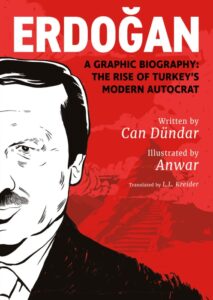Erdoğan is a very unique graphic-novel biography written by Turkish journalist and author Can Dündar and drawn by Egyptian caricaturist Anwar. This idea of telling the story of Turkey’s “modern autocrat” Tayyip Erdoğan couldn’t be executed any better.
I was so excited when I found out about this book by my fellow countryman Dündar, but was also excited that the book was about Erdoğan. Since I was born in 2000 and have never been able to remember anyone who’s in charge of the country but Erdoğan, I was so excited to read a biography prepared by such strong and free hands. Yet, I was quite surprised because I knew both Dündar and Anwar had a history of being suppressed and threatened by tyrants (not just verbally, as there have been attempts of assassinations on Dündar), but they still told their story here from an objective perspective.
It was hard for me to read, because the story starts from the very beginning of Erdoğan’s life, and seeing the backstory of an actual villain in my life made me let go of a very little part of my anger toward him. Although I found reading the book both intellectually nourishing and entertaining, it wasn’t an easy task.
The historical research of the book is massively profound, not only because Dündar was preparing for this book for a while but also because he has been one of the most important journalists of Turkey for a long time. The book has a massive value as a historical document and a professional exposition.
With extremely accurate references to historical events that changed Turkey, the characterization of Erdoğan is educational. They successfully depict the change of the kid who plays soccer secretly from his dad to the man who won against the big city of Istanbul, then to a congressman who explains his political analysis in soccer terms. This depiction of Erdoğan shows how cruelty creates cruel people, and how cruel people create cruelty.
The cartoons also have good exposition themselves. Most of them are inspired by actual photographs of the political history of Turkey, and they really reflect the atmosphere.
Additionally, the translation to English by LL Kreider is respectful to the original meanings, so it leaves no room for confusion and is rich with political terms.
I recommend this book to everyone interested in Turkey, middle eastern politics, Islamism, autocrats, effects of military intervention in internal affairs, and American interventionism.

